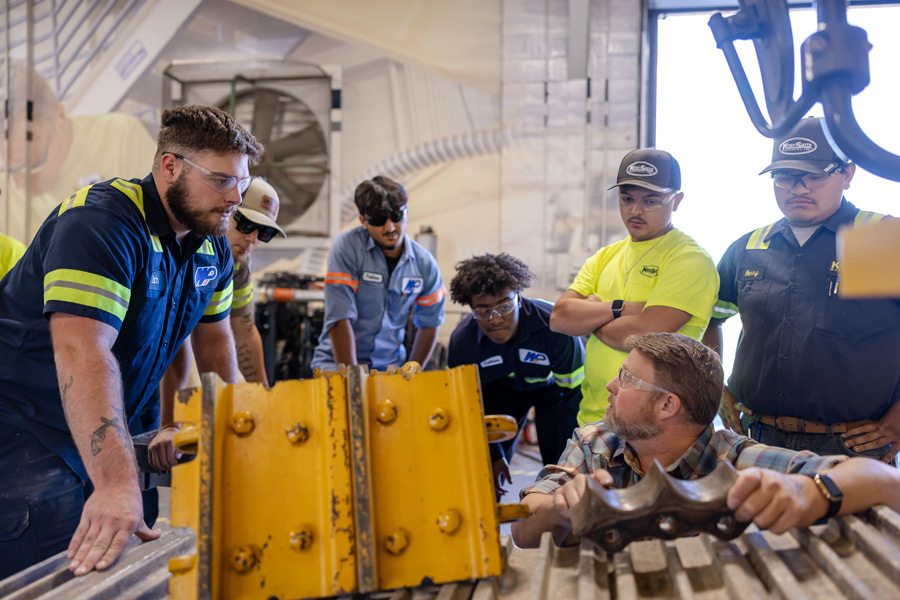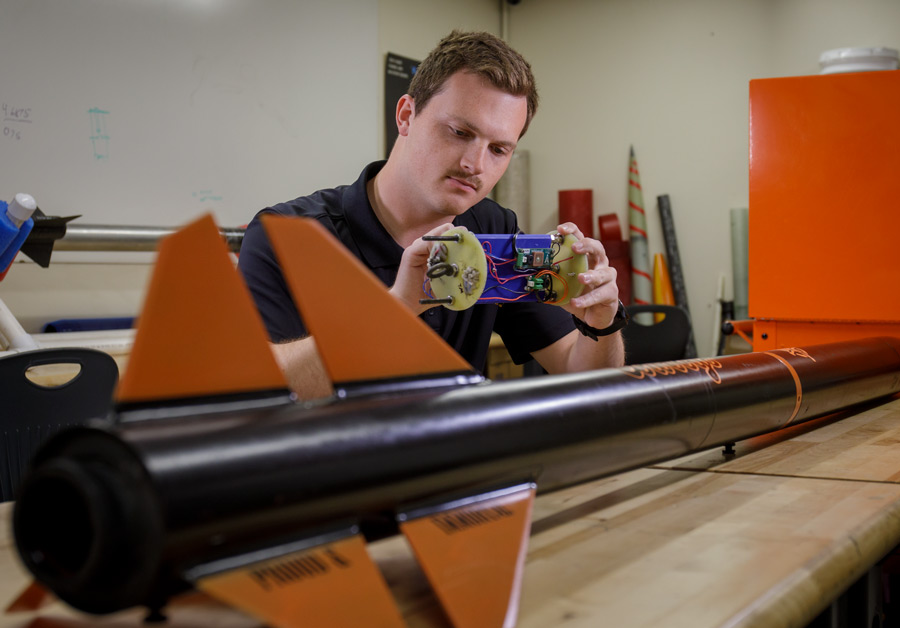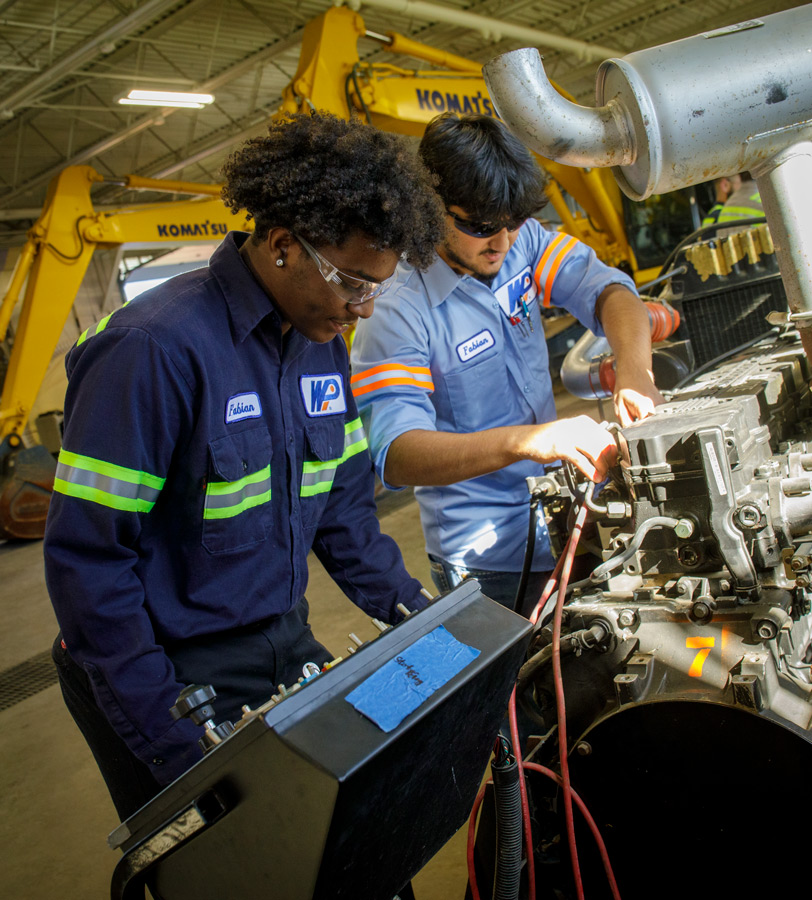Finding the Workforce Career Path for You

As the job market grows more competitive, employers seek out competent job candidates who are problem-solvers with tried-and-true practical competencies and real-world experience.
Attending a technical institution that provides specialized, career-focused education can boost students’ marketability. While many programs heavily rely upon a science, technology, engineering and mathematics curriculum, their focus can include agriculture, business and vocational training. This emphasis on practical skills ensures that students graduate ready to tackle careers in high-demand fields.
Oklahoma State University is a leader in workforce education, striving to deliver technical and career training that equips students to reimagine our world. Through our continuous dedication to hands-on learning, we help build Oklahoma's workforce, grow economic development and uncover practical solutions so we can face current challenges head-on.



High-Demand Workforce Careers You Can Pursue
Whether you're considering your next steps after high school or looking to make a job switch, pursuing a technical education opens avenues into rewarding careers across various industries. Discover which sought-after sectors you can work in, relevant career roles, employment growth and earning potential.
Jobs in Advanced Manufacturing
The advanced manufacturing industry keeps our globalized economy up and running through a robust integration of automation, technology like artificial intelligence and robotics, and data-driven processes. Professionals in this field use these tools and expertise to drive innovation, improve manufactured goods' design and production, and increase efficiency and sustainability.
Advanced manufacturing jobs include:
Industrial engineers use their expertise and data to design and optimize production systems and processes, boosting efficiency and reducing costs and waste.
- Employment growth: 11%
- Median annual income: $101,140
Industrial production managers handle a manufacturing plant’s operations, ensuring they stay on time and under budget. They hire and train new personnel, oversee quality control, use production data to guide business decisions and more.
- Employment growth: 2%
- Median annual income: $121,440
Logisticians work in supply chain management, which involves allocating materials and products, analyzing and forecasting demands and supply flows, mitigating risk and acting as a go-between for organizations and their suppliers or customers.
- Employment growth: 17%
- Median annual income: $80,880
Opportunities in Aerospace and Aviation
 The aerospace and aviation field relies on well-equipped professionals to design,
build and maintain aircraft and spacecraft. From developing new technologies to ensuring
crafts align with regulatory safety and environmental requirements, they use their
vast engineering, mechanics and technology knowledge to push innovation's limitations
to new heights.
The aerospace and aviation field relies on well-equipped professionals to design,
build and maintain aircraft and spacecraft. From developing new technologies to ensuring
crafts align with regulatory safety and environmental requirements, they use their
vast engineering, mechanics and technology knowledge to push innovation's limitations
to new heights.
Aerospace engineers help orchestrate entire aerospace projects, such as aircraft, spacecraft, satellites and missiles, from the beginning concept through design and manufacturing to testing and maintenance.
- Employment growth: 6%
- Median annual income: $134,830
Aerospace engineering and operations technicians partner with aerospace engineers to build and install mechanical components, operate testing equipment, ensure procedures run smoothly and safely, and produce usable test data. Through their technical knowledge and a keen eye for quality control, they aid in producing reliable aerospace systems.
- Employment growth: 8%
- Median annual income: $79,830
Airline and commercial pilots fly airplanes, helicopters and aircraft, ensuring safe transport for passengers and cargo. They’re responsible for monitoring their aircraft and flight navigation systems, submitting flight plans to air traffic control, executing strict safety and emergency procedures, and adhering to Federal Aviation Administration regulations.
- Employment growth: 4%
- Median annual income: $198,100
Careers Options in Agriculture and Agribusiness
The agriculture and agribusiness industries keep our world fed, and their growth is essential to combat food insecurity and rapid environmental decline. Skilled professionals work hard to integrate cutting-edge technology, uncover more sustainable farming methods, tackle critical research endeavors to solve pressing issues and more.
Agricultural and food scientists have a broad range of responsibilities, including researching crops, soil and livestock to gauge the state of food products and boost production efficiency and product quality. They also seek ways to improve food processing, packaging and delivery to ensure product stability and reduce waste. Through their diligent work, they discover practical solutions that enhance food quality and reliability, addressing local and global needs.
- Employment growth: 6%
- Median annual income: $78,770
Agricultural engineers use a more technical approach to solving challenges around pollution, power supplies, equipment and machinery, and the production of crops. They focus on developing more sustainable water management and irrigation methods, monitoring waste management, designing more efficient equipment and offering guidance on land use.
- Employment growth: 6%
- Median annual income: $84,630
Construction and Engineering Paths
Construction and engineering jobs are essential for the growth of our communities and the safety of our infrastructure. Their expertise in design, materials science, safety regulations and structural integrity — coupled with the ability to manage large-scale projects efficiently — ensures that our cities, homes and public facilities meet both current demands and future needs.
Civil engineers use their knowledge of construction principles, environmental landscapes and regulatory compliance to design and construct essential infrastructure like roads, bridges, buildings and more. Their skills position them to craft innovative solutions to challenges related to increased urbanization, growing populations, outdated infrastructure and inequitable access to key resources.
- Employment growth: 5%
- Median annual income: $99,590

Construction managers oversee the execution of industrial, residential and commercial construction projects. From beginning to end, they collaborate with civil engineers, architects, suppliers and tradespeople to source materials and labor, adhere to safety compliance and zoning codes, monitor the quality of their builds and coordinate personnel. Construction managers’ attention to detail and expertise help them finish projects efficiently.
- Employment growth: 9%
- Median annual income: $106,980
Energy and Power Careers
As our communities and technologies advance, we need reliable, sustainable energy solutions to match the pace of this continued growth. Energy professionals depend on their engineering expertise to optimize current and create new renewable energy and power sources while minimizing the cost and environmental impact.
Chemical engineers transform their understanding of chemical reactions and engineering principles into manufactured products. While they work across many sectors, their expertise drives advancements in power and energy, improving efficiency, reducing environmental impact and developing renewable technologies.
- Employment growth: 3%
- Median annual income: $121,860
Electrical and electronics engineers develop and install electrical systems, equipment, software and products for industrial, commercial and scientific use. They use their knowledge of technical standards and safety regulations to improve performance and solve any issues.
- Employment growth: 7%
- Median annual income: $118,780
Environmental engineers blend environmental science, engineering and biology to improve sustainable energy development, such as solar farms, wind turbines and other technologies. They also work to reduce pollution, manage hazardous materials and wastewater, ensure regulatory compliance and minimize greenhouse gas emissions.
- Employment growth: 4%
- Median annual income: $104,170
Gas compressor and pumping station operators play an essential role in the energy industry. They utilize their technical and mechanical knowledge to transport and process gases such as natural gas, butane, nitrogen, and hydrogen. They also monitor, maintain and repair vital machinery.
- Employment growth: 11%
- Median annual income: $61,870
Health Care and Life Sciences Jobs
 From raising the standard of patient care to pushing the limitations of scientific
research, the health care and life sciences sectors include many career paths that
offer steady employment with a real-world impact. Professionals in these fields strive
to improve access to health care and our communities’ quality of life.
From raising the standard of patient care to pushing the limitations of scientific
research, the health care and life sciences sectors include many career paths that
offer steady employment with a real-world impact. Professionals in these fields strive
to improve access to health care and our communities’ quality of life.
Health educators work hard to support communal health needs, create programs and campaigns offering educational resources and materials, and promote health and wellness through policy advocacy. They often work in public health departments, health care facilities or nonprofits.
- Employment growth: 4%
- Median annual income: $63,000
Social and community service managers advocate for the holistic health needs of individuals and communities, including mental health resources, food instability, substance abuse support and more. They collaborate with stakeholders to develop and fund social service programs, use data to improve the effectiveness of community services and strategize how to expand program awareness.
- Employment growth: 6%
- Median annual income: $78,240
Registered nurses deliver lifesaving care to patients in a range of fields, from cardiology to pediatrics to emergency medicine. They are skilled in assessing patient needs, formulating care plans, utilizing medical equipment and collaborating with other health professionals to ensure people from diverse backgrounds receive the help they need. In addition to working in hospitals, nurses can find employment in long-term care homes, outpatient facilities and schools.
- Employment growth: 5%
- Median annual income: $93,600
More Opportunities in Information Technology
The dynamic field of information technology relies on well-educated professionals who apply their technical skills, programming expertise and knowledge of software and hardware to enhance cybersecurity and data management.
Computer and information systems managers are responsible for an organization or company’s overall IT infrastructure. They ensure their employees follow cybersecurity practices, stay updated on hardware and software installations, and plan for technology upgrades. In management roles, they also oversee IT personnel and budget for their departments.
- Employment growth: 15%
- Median annual income: $171,200
Information security analysts monitor their company’s network to mitigate risk, protect data and enhance overall security measures. To demonstrate the effectiveness of their work, they create reports, standardize best practices and stay on the cutting edge of IT security trends.
- Employment growth: 29%
- Median annual income: $124,910
Build a Future-Proof Career at OSU
Experience the difference of a workforce education at Oklahoma State University. As the nation’s leading land-grant institution, we build on our strong legacy in agriculture, engineering and technical education to guide our academic approach and fuel our commitment to the common good — for Oklahoma and the world.
OSU Tech embodies this mission and equips you to turn ideas into tangible impact. Whichever workforce program you pursue, receive career-focused training and hands-on experience to prepare you for a seamless transition into the workforce.
Discover which workforce degrees are best for hands-on learners.
